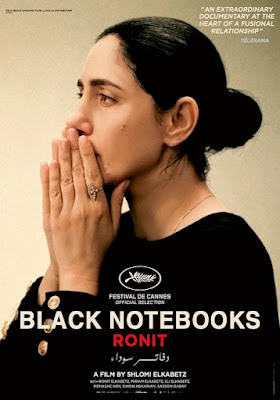If you have only seen the very top Israeli films to reach American distribution deals over the last twenty-five years, you will probably still recognize the late Ronit Elkabetz. She starred in The Band’s Visit, Gett: The Trial of Viviane Amasalem, and Late Marriage. She also happened to be the daughter of Jewish Arab parents (originally from Morocco), so her prominence challenged stereotypes both inside and outside Israel. Her greatest collaborator was her brother Schlomi, with whom she co-wrote and co-directed the Viviane Amasalem trilogy. The surviving Elkabetz sibling pays tribute to his sister and documents the final years of her life in Black Notebooks: Ronit, which opens today in Los Angeles.
When watching the extensive behind the scenes footage of Gett, representing about a full third of Elkabetz’s documentary, viewers might be tempted to draw a casual relationship between his sister’s exhaustingly intense performance and the lung cancer she ultimately succumbed to, two years after the film’s release. Frankly, Gett so dominates the documentary, viewers who have not seen it might be confused by the Kafkaesque scenes that unfold.
Although Israel is in many ways the model of a progressive legal system, divorces remain the jurisdiction of antiquated rabbinical courts, regardless of petitioners’ religion. Gett was very definitely a passionate protest against that system.
Very little of Elkabetz’s other work is incorporated into the doc, which is a shame, considering how wonderfully luminous she is in The Band’s Visit. However, we see her as she really was. Her brother was perfectly positioned to document her, since they shared a Parisian flat together, when not supporting Gett’s tour of the film festival circuit, including Cannes.
Elkabetz captures his sister’s dignity and resilience while undergoing treatment. We also get a sense of how the siblings collaborated creatively so successfully. It is a rather poignant portrait of a brother-sister relationship, but those who know their films will get much more out of Black Notebooks.
Schlomi Elkabetz refers to a notebook in his title rather than a diary or a testament, to evoke a sense Ronit jotting down notes on both big creative projects and mundane chores. Tragically, she discusses a Maria Callas biopic we will never have the chance to see her in. However, Black Notebooks gives her an opportunity for a posthumous farewell to her friends, fans, and industry colleagues. Respectfully recommended (particularly for patrons of Israeli cinema who know the Amasalem trilogy), Black Notebooks: Ronit opens today (11/4) in Los Angeles at the Laemmle Town Center 5 and next Friday (11/11) in New York at the New Plaza Cinema.

